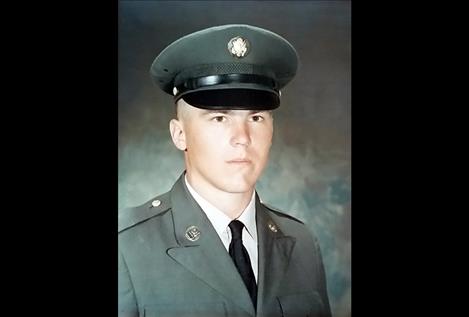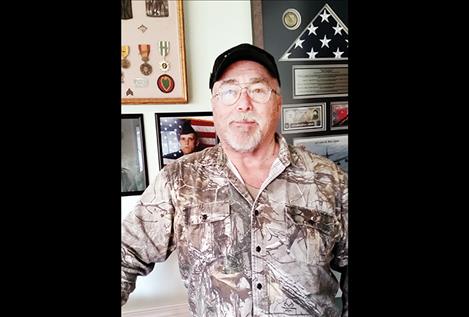Veteran Spotlight
Allen Corneliusen Sept. 5, 1948 Vietnam 11th Light Infantry Brigade U.S. Army – Sergeant E-5
Hey savvy news reader! Thanks for choosing local.
You are now reading
1 of 3 free articles.
In 1967, Allen Corneliusen left home to go to Butte, Montana, which is where he ended up enlisting in the Army for three years. He called home and told his parents what he had done.
As he recalls, he went by train to Fort Lewis, Washington, where he attended about six weeks of basic training. He’d been advised never to volunteer for anything, but he volunteered to be a bus driver and took guards to their posts.
He was then sent to Fort Gordon, Georgia, for about six weeks of Advanced Individual Training. He also volunteered to be the driver for the company commander. Before enlisting, Allen had trained in Billings, Montana, to be a pilot and actually got his license. He thought he’d be a military pilot, but it didn’t do a bit of good in the Army. During the height of the Vietnam War, they were looking for “ground pounders.” He found himself in the regular infantry and was trained for field work.
In February, he got orders for Vietnam and flew to Cam Ranh Bay and then to Da Nang and Duc Pho. He remembers being told during a jungle survival class that they were in one of the safest places in Vietnam. They had never been attacked. But, that night they suffered a mortar attack.
Allen served as part of the 11th Light Infantry Brigade of the Americal Division, 1st Battalion, 20th Infantry. His time was spent mostly in the field with maybe a day now and then going back for supplies. Colin Powell was the division commander.
Allen was wounded on Memorial Day of 1968. He and his platoon sergeant were both hit by “Bouncing Betty” mines, which are mines that bounce up when tripped and explode higher off the ground. Allen was sent to a field hospital in Da Nang and then flown to the hospital ship USS Sanctuary. He called his parents and had an emotional conversation. He was sent to Guam for recovery and wondered if he had been sent to a Navy hospital by mistake because he was the only Army soldier there and the rest were Marines. While he was there, he received the Purple Heart award. Allen says he was one of the lucky ones: he got out, although in a bad way.
From February to May of 1968, the four months he was in Vietnam, Allen’s company had a 60 percent casualty rate (15 dead and 60 wounded). He lost two good friends from high school who didn’t make it back. That year, 1968, had the highest casualty rate in all of Vietnam. It was also the year for the highest usage of Agent Orange. He remembers being under a poncho while it was being sprayed and, evidently, suffered no effects from it.
Allen was sent to Fort Riley, Kansas, to continue recovery. After about 30 days, he was sent on an exercise to Alaska. Later, he was sent on a NATO exercise to Germany for testing preparedness. Back at Fort Riley, he participated in operations Non-Commissioned Officer training. He wasn’t a sergeant as required, so he went from PFC to E-5 in two weeks. One time, he was part of an honor guard for Eisenhower. He remembers a hot day in Kansas in dress woolen greens. He spent the rest of his enlistment there and was discharged in July, 1970.
Were there any good things about being in Vietnam? He got to see a beautiful country, but the answer was mostly, no. The government didn’t recognize early troops on the ground at the time, but later they admitted early U.S. involvement. Some soldiers were given medals and then had them taken away, and the politics controlling the war were very demoralizing, he said.
It took Allen 20 years to open up after he finally returned home. He figured he would be sent to Vietnam when he enlisted, and he doesn’t regret that, but not being able to find people he knew after his service did bother him. When he was wounded, he lost his backpack with all the pictures and mementos in it. He has done a lot of research and has a thick file of reports and information. He was able to find his name on the daily report where he was medivacked out. A liaison officer finally consented to leniency of privacy rules and tracked down one name for him – his platoon sergeant.
Allen found out the sergeant was going to a VA hospital in Ohio. He got an Ohio phone number for him and made the call. It was answered by the platoon sergeant’s mother. She put the two of them in touch. They have kept in contact every Memorial Day. Allen felt a lot of weight off his shoulders when he found his sergeant.
Allen feels he should go back to Vietnam, but it’s probably too commercial and touristy now. He’s seen the Vietnam Veterans Memorial twice. The first time was with his dad and the second time with a cousin who had served in Vietnam. It was tough to see the memorial, but he’s glad he did it. He recalls that some veterans stood back, not able to approach the Wall, as it’s called. He took tracings of the names of people from Lake County, and they’re currently in the county courthouse.
Allen thinks military service is good for kids. He believes service (but not necessarily combat) should be required for all young men and women with no special opt-out for those with position or power. It instills respect and discipline to some degree compared to what he sees now. He doesn’t agree with the U.S. sticking “our nose” in all over the world because there are problems here to take care of.
Allen thinks he would do the same over again. Regarding the injury, it brought him home. Thank you for your service, Allen.

















